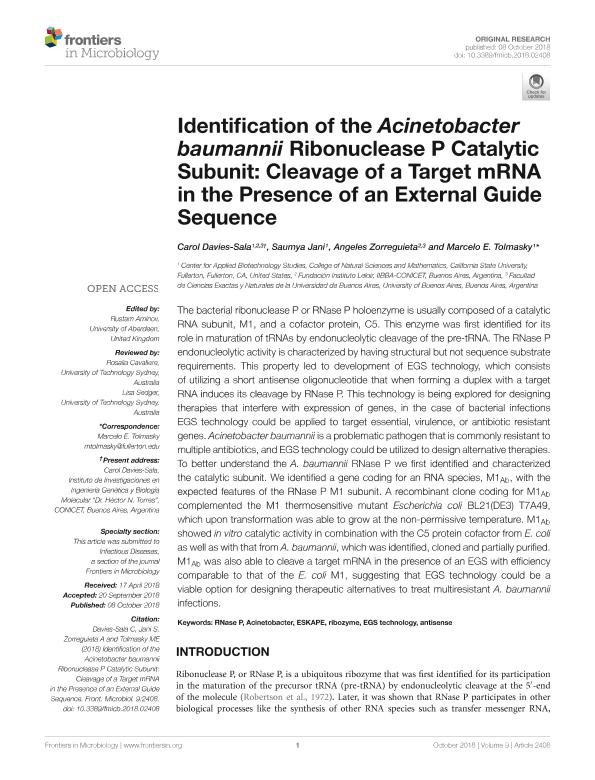Mostrar el registro sencillo del ítem
dc.contributor.author
Davies Sala, Carol Giselle

dc.contributor.author
Jani, Saumya
dc.contributor.author
Zorreguieta, Ángeles

dc.contributor.author
Tolmasky, Marcelo E.

dc.date.available
2019-11-01T19:21:45Z
dc.date.issued
2018-10
dc.identifier.citation
Davies Sala, Carol Giselle; Jani, Saumya; Zorreguieta, Ángeles; Tolmasky, Marcelo E.; Identification of the acinetobacter baumannii ribonuclease p catalytic subunit: Cleavage of a target mRNA in the presence of an external guide sequence; Frontiers Research Foundation; Frontiers in Microbiology; 9; OCT; 10-2018; 1-8
dc.identifier.issn
1664-302X
dc.identifier.uri
http://hdl.handle.net/11336/87849
dc.description.abstract
The bacterial ribonuclease P or RNase P holoenzyme is usually composed of a catalytic RNA subunit, M1, and a cofactor protein, C5. This enzyme was first identified for its role in maturation of tRNAs by endonucleolytic cleavage of the pre-tRNA. The RNase P endonucleolytic activity is characterized by having structural but not sequence substrate requirements. This property led to development of EGS technology, which consists of utilizing a short antisense oligonucleotide that when forming a duplex with a target RNA induces its cleavage by RNase P. This technology is being explored for designing therapies that interfere with expression of genes, in the case of bacterial infections EGS technology could be applied to target essential, virulence, or antibiotic resistant genes. Acinetobacter baumannii is a problematic pathogen that is commonly resistant to multiple antibiotics, and EGS technology could be utilized to design alternative therapies. To better understand the A. baumannii RNase P we first identified and characterized the catalytic subunit. We identified a gene coding for an RNA species, M1Ab, with the expected features of the RNase P M1 subunit. A recombinant clone coding for M1Ab complemented the M1 thermosensitive mutant Escherichia coli BL21(DE3) T7A49, which upon transformation was able to grow at the non-permissive temperature. M1Ab showed in vitro catalytic activity in combination with the C5 protein cofactor from E. coli as well as with that from A. baumannii, which was identified, cloned and partially purified. M1Ab was also able to cleave a target mRNA in the presence of an EGS with efficiency comparable to that of the E. coli M1, suggesting that EGS technology could be a viable option for designing therapeutic alternatives to treat multiresistant A. baumannii infections.
dc.format
application/pdf
dc.language.iso
eng
dc.publisher
Frontiers Research Foundation

dc.rights
info:eu-repo/semantics/openAccess
dc.rights.uri
https://creativecommons.org/licenses/by-nc-sa/2.5/ar/
dc.subject
ACINETOBACTER
dc.subject
ANTISENSE
dc.subject
EGS TECHNOLOGY
dc.subject
ESKAPE
dc.subject
RIBOZYME
dc.subject
RNASE P
dc.subject.classification
Biología Celular, Microbiología

dc.subject.classification
Ciencias Biológicas

dc.subject.classification
CIENCIAS NATURALES Y EXACTAS

dc.title
Identification of the acinetobacter baumannii ribonuclease p catalytic subunit: Cleavage of a target mRNA in the presence of an external guide sequence
dc.type
info:eu-repo/semantics/article
dc.type
info:ar-repo/semantics/artículo
dc.type
info:eu-repo/semantics/publishedVersion
dc.date.updated
2019-10-22T17:57:27Z
dc.journal.volume
9
dc.journal.number
OCT
dc.journal.pagination
1-8
dc.journal.pais
Suiza

dc.description.fil
Fil: Davies Sala, Carol Giselle. California State University; Estados Unidos. Consejo Nacional de Investigaciones Científicas y Técnicas. Oficina de Coordinación Administrativa Parque Centenario. Instituto de Investigaciones Bioquímicas de Buenos Aires. Fundación Instituto Leloir. Instituto de Investigaciones Bioquímicas de Buenos Aires; Argentina
dc.description.fil
Fil: Jani, Saumya. California State University; Estados Unidos
dc.description.fil
Fil: Zorreguieta, Ángeles. Consejo Nacional de Investigaciones Científicas y Técnicas. Oficina de Coordinación Administrativa Parque Centenario. Instituto de Investigaciones Bioquímicas de Buenos Aires. Fundación Instituto Leloir. Instituto de Investigaciones Bioquímicas de Buenos Aires; Argentina
dc.description.fil
Fil: Tolmasky, Marcelo E.. California State University; Estados Unidos
dc.journal.title
Frontiers in Microbiology
dc.relation.alternativeid
info:eu-repo/semantics/altIdentifier/doi/http://dx.doi.org/10.3389/fmicb.2018.02408
dc.relation.alternativeid
info:eu-repo/semantics/altIdentifier/url/https://www.frontiersin.org/articles/10.3389/fmicb.2018.02408/full
Archivos asociados
